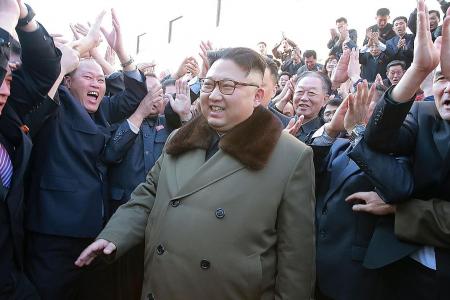Kim Jong Un knows exactly what he's doing
North Korean leader's missile tests and crackdown on internal threats all meant to ensure survival of regime
With a suspected role in the assassination of his estranged half-brother and a string of increasingly aggressive missile tests, the North Korean leader appears to be testing the patience not just of Washington but also his key ally, China.
It is a high-stakes game that may push the region into the worst conflict it has ever seen.
Mr Kim Jong Un's actions have a ruthless internal logic, however, and while he has a plan, there is no sign that anyone has a coherent strategy for stopping him.
Last Tuesday, the Chinese Foreign Ministry warned that Washington and Pyongyang were racing towards an unnecessary but dangerous confrontation.
It called on North Korea to listen to international condemnation of its nuclear and missile tests.
But the likelihood of Mr Kim, 33, listening to advice or threats from the US, China or anywhere else seems practically nonexistent.
What Mr Kim wants is simple - to secure his own survival and that of his regime.
That means annihilating any potential claimants to the role, and acquiring atomic weaponry fearsome enough to deter any outsider from trying to bring him down.
Just as important as building the ability to strike abroad has been entrenching power at home.
When his father died in December 2011, many outside observers wondered whether the younger Kim - then in his late 20s - could assert control over older, more established members of the elite.
A South Korean think-tank estimated in December last year that more than 300 people had been executed since he took office, including 140 senior officials and at least one uncle.
With the death of his half-sibling Kim Jong Nam, 45, at Kuala Lumpur international Airport on Feb 13, the younger Kim will have further entrenched his power.
The older brother was not seen as a threat, but if Mr Kim did have a role in the murder, the demonstration of North Korea's reach - and willingness to take risks - will resonate within the establishment.
VITAL SUPPORT
China's financial and military support has long been vital to the North Korean regime's survival, with Beijing maintaining close relations with both Mr Kim's father and other key officials.
The older Kim lived for years in China, suspected to have been protected by Chinese intelligence in part for his connections to his uncle Jang Song Thaek, one of the most important power brokers in the North until his execution by Mr Kim shortly after he took power.
Five days after the killing of the older Kim and six days after Pyongyang tested a ballistic missile in violation of international sanctions, Beijing announced it was suspending coal purchases from North Korea.
It is essentially cutting off one of Pyongyang's few reliable sources of international currency, and is one of the most public shows of frustration by Beijing towards its neighbour in recent history.
The March 6 test of a quartet of ballistic missiles would have irritated Beijing further.
This again demonstrated that Mr Kim has no intention of bowing to the demands of any external power.
It was also a reminder that US attempts to frustrate North Korea's weapons developments have proved largely unsuccessful.
It may be a coincidence but recently, The New York Times reported what it described as an ongoing but not always effective US campaign to interfere with North Korea's nuclear programme.
The Times reported that US officials have also been considering a range of new tactics including direct military strikes on North Korean nuclear facilities, or what they call "left of launch" actions that would hope to neutralise North Korean missiles before take-off.
Whether such tactics by the US or others could or will ever work is far from clear.
Pyongyang and the Russian scientists it has hired are merely trying to replicate technology the US, Russia and China perfected in the 1950s or soon after. That makes cyber attacks potentially less effective.
Successive US administrations have long hoped that China would be able to persuade North Korea to slow its nuclear progress and perhaps open up to the world.
Chinese officials have repeatedly attempted to reassure Washington as well as regional players - particularly Japan and South Korea - that they have Pyongyang under control.
In the Kim era, however, such reassurances are increasingly unconvincing. - REUTERS
The writer is global affairs columnist for Reuters, writing on international affairs, globalisation and other issues
Get The New Paper on your phone with the free TNP app. Download from the Apple App Store or Google Play Store now



